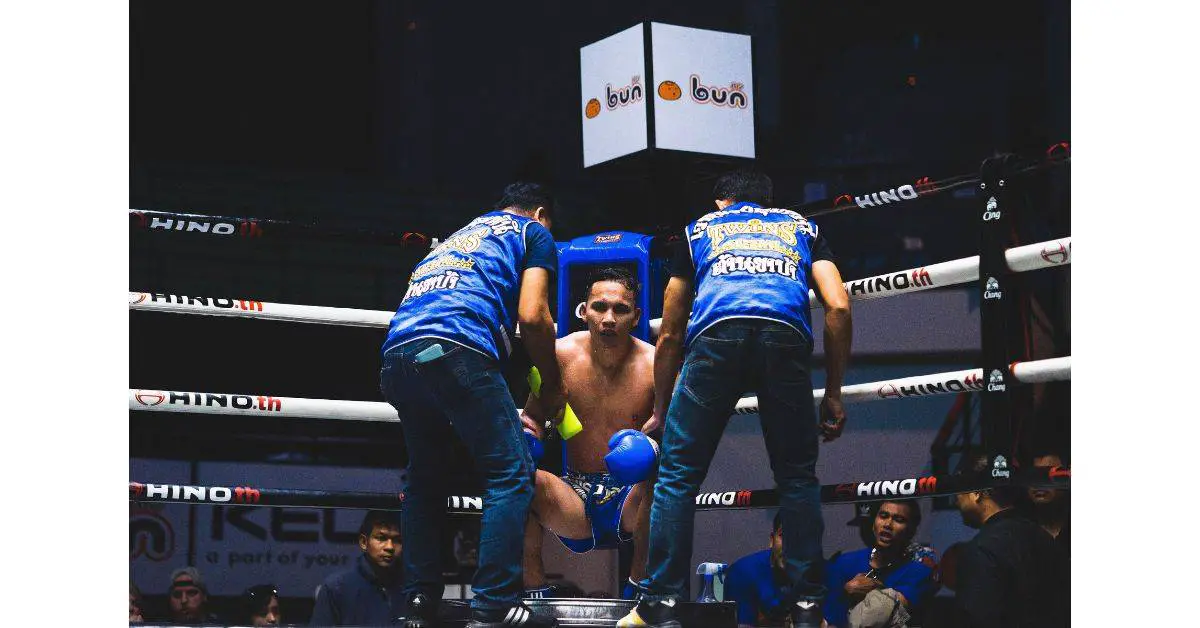Boxing is one of the most dangerous martial arts and sports in the entire world. For comparison, Brazilian Jiu-Jitsu isn’t as risky because it doesn’t include striking techniques. However, even kickboxing doesn’t compare to boxing. That’s because boxing emphasizes sparring and competing, which are the two most dangerous exercises.
Boxing is definitely worth the risk because of the many mental and physical benefits you’ll gain from it. These benefits range from increased confidence, higher self-esteem, and better mental health, to lower body fat percentage, and living a healthier lifestyle. You should, however, know the risks before starting to train.
If you want to know what are the risks of boxing, stay tuned for the next section.
Back to our topic; competing and sparring are the most dangerous parts in boxing. They also are the ones that will provide the most benefits, as they’ll increase your confidence and prepare you for self-defense the most.
That said, if you’re concerned about getting hurt, you might want to skip these exercises. That way, you’ll greatly reduce your risks of getting some type of injury.
Nevertheless, the benefits and results you’ll gain from boxing—are simply too good to ignore. You can even expect your overall mental health to rise as a result of involving yourself in the art of punching.
Before we dive into the risk themselves, if you’re interested in reading about whether you can hurt your brain while you box, follow the link to an article of mine on the topic.
What are the risks of being a boxer?
The risks of being a boxer—are plenty. For instance, there’s an entire injury named “boxer’s fracture”. Usually, it happens when you punch in high speeds. More on that later. For now, let’s examine the most common injury sports for professional and amateur boxers.
Being a boxer has one severe risk you should watch out for: brain damage. While you can injure your wrist, hands, fingers, knuckles, and even your nose, no injury compares itself to brain damage, particularly CTBI. As a result, it’ll be best to stop when you notice yourself getting too many hits to the face.
Back to the boxer’s fracture, here’s what it is: according to Cedars-Sinai,
A boxer’s fracture is a break in the neck of the 5th metacarpal bone in the hand. It usually happens when you punch an object at a high speed. Symptoms of a boxer’s fracture include pain and swelling of the hand, limited range of motion of the pinky finger, and misalignment of the finger.
There’s an actual injury named after this sport. The only thing we can understand from this is that we should watch out when getting into the ring.
However, brain damage should be your real concern. In fact, 20% of all professional boxers experience some type of brain damage, a highly concerning number.
I like to share the following video as it perfectly demonstrates what vigorous sparring and competing can do to you.
Is being a professional boxer worth it?
Now that we understand the risks of being a boxer, let’s examine whether you should turn pro. Eventually, if you’re uninterested in turning into the professional scene, you can skip this section.
Being a professional boxer is worth it, especially for those wanting to be a boxer full-time. Staying in amateur scene—will only limit your salary. The competition in the pro scene, of course, is much more prominent. As a result, you must continue to push your mental and physical limits, to ensure you don’t get complacent.
Most professional boxers think they’re in a state where they can let go of the guidelines. As a result, they stop wearing headgear, hand wraps, and gloves when sparring.
That’s why you see many retired boxers with permanent damage. Do you really want to experience such injuries for the rest of your life?
I used to box bare-handed. I did that because I thought my punching technique was perfect. While my past self didn’t experience any pain or injuries from that, I currently do. And let me tell you something, I certainly do not appreciate the injuries my past self caused to me right now.
Is being an amateur boxer worth it?
If you desire to become an amateur boxer, good for you. Taking such a step, and starting to compete—can be tough on the mind and body. However, once you start your training, you’ll begin to remember why you started in the first place. Let’s examine whether it is worth the effort.
Being an amateur boxer is worth it for people who want to eventually become professionals. If that’s not what you want to do for a living, you might badly and permanently injure yourself in the process. Amateur boxers fight more often than professional ones. As a result, they’re more likely to get hurt.
Amateur boxers take the most hits to the head. It’s not uncommon to see them fighting competitively 30 times a year, or about once per 9 days. They have such a fighting schedule, since they want to get their names out there, so they can turn pro.
You can understand how much stress and strain they put their bodies through. Really, imagine what their brain goes through every time they get punched.
If going full-time is one of your primary goals, you must go through the amateur scene. So be prepared to be better than everyone else!
If you want to learn about tips and tricks to help you progress faster in your boxing journey and turn pro faster, follow the link.
How to box safely
Boxing safely can be quite difficult. If, however, you emphasize safety over training, you’ll ensure both your short and long-term health. Because this fighting style has so many injuries, we must further emphasize the importance of keeping your body safe.
To box safely, you must always wear hand wraps, boxing cups, gloves, and headgear. By doing so, you’re minimizing your chances of receiving any type of joint injury, especially in the hands, and face lacerations. However, headgear doesn’t protect as much from concussions and brain damage.

So yes, you can’t really prevent getting concussions and brain damage. That said, if you win more often and dodge as many hits to the face as possible, you’ll ensure you’re on the right track for maintaining a healthy body.
Wearing protective gear should be a holy ritual you perform prior to your training. You need to be scared of punching the bag without hand wraps and gloves. If you do, you will end up injuring yourself, even if you don’t feel that now.
If you want to learn more about joint injuries, follow the link to an article of mine explaining such risks.
Is boxing dangerous or safe?
Boxing can be both dangerous and safe. If you avoid sparring regularly, and you don’t compete while always wearing protective gear, you’re on the safer side. However, most people don’t pay attention to wearing protective gear. As such, they’re putting themselves on the risky side of things.
Boxing is one of the most dangerous sports in the world, as you have two people inside a ring wanting to knock out each other. As a result, a boxing match can get quite messy—to say the least. The most common injuries are: joint damage, face lacerations, wrist, and hand (joints) injuries, and brain damage.
Ensure to always wear protective gear, to minimize the risk of getting injured. That means you should always wear gloves, hand wraps, and headgear while sparring. You can even get boxing cups, to protect the most important body part.
Final words
To end this article, I want you to understand how indispensable it is to keep yourself safe in such a dangerous sport. If you want to minimize your risk of getting any type of injury, you must always wear protective gear, including hand wraps, gloves, headgear, and cups.
Likewise, it’ll be best if you avoid regular sparring and competing, as they’re the most dangerous part. However, if you want to either turn pro or set yourself in the amateur scene, know the risks of doing so.
If you enjoyed reading this article, you’ll also enjoy reading about whether boxing should be a school sport. What do you think? Follow the link!

